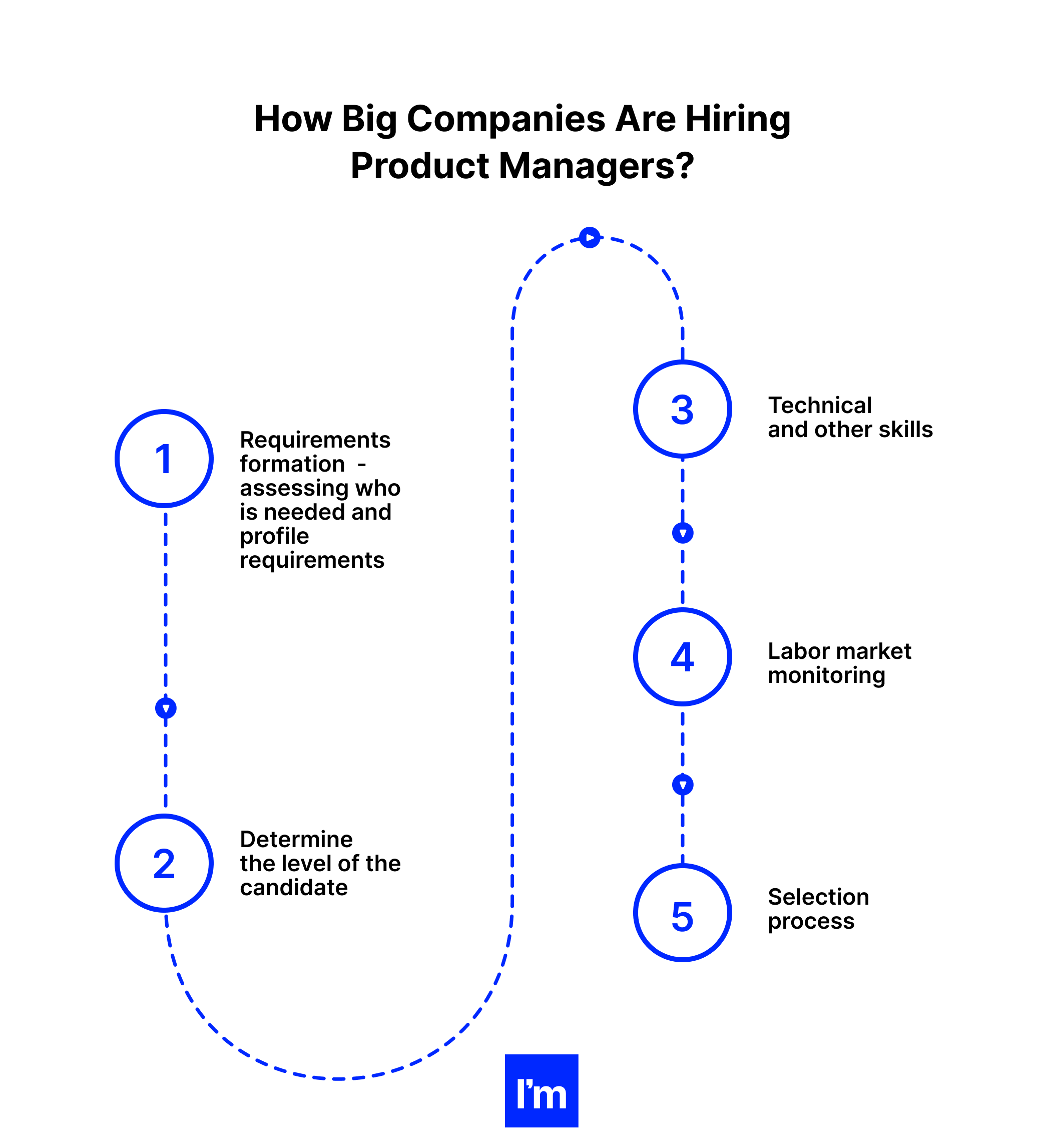The popularity of the specialty of Product Manager has increased several times over the past 3 years. We see many announcements about the search for a product manager, courses for the training of specialists, cases, etc. Many young men and women are eager to start a product management career.
Still, many startup owners aren’t aware of whу they need one, what tasks they perform and where to find valuable candidates (some even confuse the product manager with the general director).
In this article, we will consider hiring product managers in detail, we will talk about the responsibilities and zones of responsibility, their importance, and what value they can bring. If you plan to hire one, but are still doubting this information will help you make a final decision.
Why do SaaS startups need product managers?
Everyone knows Google, Uber, Tinder, and Airbnb. Thanks to production managers, millions of people use these products. They reveal the need for the target audience, formulate positioning, test hundreds of hypotheses and calculate unit economics.
Yet there are founders who haven't decided who they require: a project manager, a scrum master, or a product owner.
A project manager is a person who is responsible for each aspect of the product during launch and after the release. Developers, marketers, analysts, designers, and testers help them.
According to legend, these magical unicorns promote the product from idea to launch and can bring the quality of customer service to a new level. But let's start with bad news: hiring a product manager, which is also suitable for your team, is not a cakewalk.
These people fall into a gray, buffer zone between developers, marketing, and sales. According to one study, 88% of them began their career in another industry. For this position, a candidate with a diploma in the field of IT, psychology, or business is equally suitable. It requires a business grip, the ability to see the final product, and, ideally, a high level of technical knowledge.
They help dedicated teams to conduct projects for various outsourcing and outstaffing customers, set a general vision, and conjure over a sales funnel. They think about future scalability and how it will eventually be possible to extract profit from this.
As a result, it is they who make the product tempting for investors. Therefore, we are not embarrassed at all to pay them more than the programmers themselves. The only problem is how to select such a person among all candidates.
Example
To figure out why your SaaS startup should consider hiring product managers let’s see an example.
Jack is a production manager in a startup. He is responsible for the application with the delivery of products for recipes.
When Jack came to the company, it was not clear which features would be included in the first version of the product. The team made a huge list, which was unrealistic to implement. Jack analyzed competitors, conducted a deep interview with the audience, and determined the value of the product.
After doing so he managed to make a realistic list of features for the first version.
A month after the launch of the service, Jack had the first product data. The costs were bigger than the profit, ROMI was -5%. Jack began to watch metrics and realized that the problem could be in onboarding.
Together with the marketer, Jack thought out the user involving onboarding and gave product designers a task for creating new screens. After several iterations, the screens were ready. Jack conducted corridor testing and compiled documentation for adding new screens. ROMI increased to 7%.
Now investors want to see artificial intelligence in the product. Jack discussed the opportunity to add AI with developers, project managers, and business consultants. The introduction of technology will take a lot of time, but this is real.
Together with the developers, Jack estimated the development time, release date and conducted grooming. Before starting development, Jack made the documentation and described user Stories and Acceptance Criteria so that the whole product team understands what the result should be.
As you see, in the long run, hiring product managers has helped the above-mentioned firm succeed.
SaaS product manager role, responsibilities, and key skills
The product manager is the one who sets tasks for people. To do this, a good PM needs to understand different directions and have certain skills.
Hard Skills
Market analysis
Your PM needs to be able to evaluate the volume and dynamics of market growth. This is necessary to develop a realistic go-to-market strategy.
Analysis of competitors
Your PM has to understand what market share is occupied by competitors, what distinguishes their products, and what are the advantages and disadvantages. This will help to build positioning that will distinguish you from competitors.
Analysis of the target audience
A PM will investigate the needs of the audience: conduct interviews and surveys, analyze the information received, and compose persons.
Prioritization of features
They will determine which features to develop in the first place, and which can wait.
Creating roadmap
A PM has to plan to develop new features: evaluate the dates and terms of the release. The roadmap will make the development process more transparent.
Strategy development
They will have to develop a long-term product strategy. Moreover, they will create a vision of what functionality you need to come in five years.
OKR setting
It is PMs who will set ambitious goals for the product team. To do this, they give specific tasks and track the result.
Choosing a product monetization model
Another good reason to consider hiring product managers is that they will determine the monetization model that suits your product best. Your PM needs to understand which model is suitable for the product: One-Time Payment, Subscription or can be In-App Purchase + Ads.
Calculation of Unit Economics
A good product manager understands whether the product will make a profit. They calculate the costs of attracting one user (CAC - Customer Acquisition Cost) and income from this user (LTV - Lifetime Value).
Working with a designer
A PM makes up the UX screens of the application, works together with the designer on the UI, collects a working prototype, and conducts usability testing.
Documentation
Product managers conduct documentation for each version of the product, describing all tested hypotheses. They are preparing User Stories and Acceptance Criteria.
Analysis of marketing and business metrics
A PM calculates the CPU, ARPU, and ROMI to evaluate the profitability of the product. They also track the effectiveness of each stage of the funnel, consider conversions and look for Bottleneck.
Conducting experiments
Based on the data, your PM has to draw logical conclusions, formulate hypotheses and check them experimentally. A good manager has to be able to conduct A/B testing.
Soft skills
The ability to sell ideas
A PM coordinates your vision of the product with the CEO and stakeholders. Your manager also has to be able to sell his/her ideas to the team in order to inspire it.
Team management
They work using agile methods: lead a backlog, attend meet-ups, and organize the reviews and retrospectives of the sprint. Since they are responsible for the result of the team’s work, PMs have to find an approach to each of its members and understand what motivates them.
The ability to give and receive feedback
Relations with the team and the results of the work will depend on how the chosen PM gives feedback. They need to give understandable and specific feedback that does not reduce the motivation of colleagues.
Solution of problems
When hiring product managers remember that they will face problems in metrics. For instance, a few weeks after the new release ARPU fell by 30% or D30-RETENTION is too low.
Your manager has to independently find solutions to problems and take responsibility for them.
The ability to work in conditions of uncertainty
Product Managers drive the product development and check metrics, but everything may not go according to the plan. Experienced PMs need to be able to rebuild plans.
Additional skills of a product manager
Technical skills like programming in JavaScript, React and C++ are not required, it is rather a plus to the resume. But it will be great if your web project manager has:
- Understanding the logic of the application device: front-end, back-end, database
- Understanding the basic syntax of languages in which the product is being developed
- Understanding the elements of the interface and layout
- Basic skills in working with SQL, Python
Pain points and how to overcome them
Knowing who are PMs and what they do, let’s now see the main pain points before hiring a SaaS product manager and how to tackle them.
The main pain point here is that the market of product managers is overheated, dynamic, and the candidates are very different. Candidates often go to interviews and know how to tell stories about their achievements. But you have to be prepared for this.
Selection, scoring, market - expectation, and reality
Colleagues from HR will help you organize the primary selection and selection process. Your task, as a CxO, is to manage the requirements and the process of hiring itself.
It is important to act according to this scenario: if you liked the candidate, then call right away. Also, contact those who you doubt about (to adjust your expectations and the work of HR). Such simple work will reduce the time for you and your colleagues from the personnel department.
Specify one interview with a strong or medium, in your opinion, candidate. So you can more competently manage the selection of candidates and you can understand what to expect from the labor market, and there will be something to compare the rest with.
Test task - for and against
Test tasks are your personal solution whether to use them or not. We practice their use, as they standardize selection and make it possible to compare the test tasks of candidates.
The main argument “for” their use is the possibility of comparing and a clear understanding of how the candidate is preparing for an interview, how they think, and how they will work.
The argument “against” - candidates do several tasks at the same time, which leads to a decrease in the general quality of test tasks. The waiting time is increasing while the candidate is preparing the test task.
Preparation of product manager interview questions
Prepare 5 or 7 questions for a vacancy on the basis of already formed criteria, one-two common questions, questions about motivation, achievement, and any others that you consider to be necessary.
All questions should be related to the profile of the vacancy and the work to be done. Ask about working with a team. Find out what processes and techniques were used in the work. Ask a few specific questions related purely to the profile of the proposed field of activity.
Hiring product managers
When to hire a product manager
We always take a new PM for a specific task, project, or direction: launching a mobile application, increasing the relevance of the recommendation feed, and increasing the check/conversions on the checkout pages. A person must understand what scope of work in the product they will be responsible for.
It is extremely inefficient to take an employee just because you want it - a person simply will not reveal themselves and their potential, and for a year or two they will do exactly what they are asked (no more, no less), then they will get tired of it and you will have to look for an employee again.
Many heads underestimate the consequences of hiring employees who do not meet these qualities. Where, in this case, the winding road of an IT product can lead, we know from the examples of Skype, Yahoo, and other fading projects.
Hence, ensure what role you should look for: a product owner or a product manager.
To be more precise, you should start hiring product managers after raising a seed round.
Where to find one
Basically here we have 3 main channels:
- In-house hiring
- Freelancers
- Tech talent marketplaces
Let’s see what each one offers.
In-house hiring
Dealing with local talents rather suits those product owners who tend to develop their software with a team of permanent employees. In other words, these are guys who like office routine, fixed wages, and 9-5 jobs.
While this approach can bring obvious advantages (your devs work only for you, you know each one personally, etc.) there are some drawbacks (more expensive solution, lack of qualified IT product managers nearby, etc.)
Freelancers
Hiring freelancers deprives us of renting an office, paying monthly wages, and gives us a wider talent pool. Yet we still have to hold the recruiting and vetting process on our own, which eventually leads to wasted time, effort, and poor employees' average experience rate.
On the other hand, hiring product managers will greatly save your costs.
Tech talent marketplaces
Turning to tech talent marketplaces for assistance gives us benefits that outweigh both options above.
Hiring product managers via a specialized marketplace ensures us that we will be dealing with top-notch, pre-vetted, and experienced employees.
No more need to rent an office, publish vacancies, pay job boardings to list your requirements, and spend time sorting rookie managers from seasoned ones.
All you have to do is to contact a tech talent marketplace and interview those candidates that you liked the most.
Hiring product managers has never been so fast, easy and cost-effective.
How big companies are hiring product managers?
After conducting a lot of interviews with product managers over the past five years, we’ve created our own selection scheme for candidates.

1. Requirements formation - assessing who is needed and profile requirements
The first thing to start with is a product development plan and requirements for a specific role. First, you need to determine the level of who you need and their competence.
“First of all, you need to look for less popular candidates who do not get 20-30 offers a week. There are such people outside the LinkedIn network (according to our estimate, there are about 20,000 people), and you can search for them through the network,”
Taya Mliuzan, Managing Partner in CNA International IT.
2. Determine the level of the candidate
When hiring product managers it is crucial to determine the area of responsibility of the future employees.
If it is part of a product, then it is approximately intermediate and entry-level. If he/she is responsible for a separate product, then this is more likely to correspond to a high level of a product manager.
3. Technical and other skills
Now you should ask yourself a question about the level of technical knowledge of the future candidate.
If you are hiring a candidate for a job with a specific technological platform, then this must be indicated in the vacancy.
Pay attention to those specific programs whose skills are required for your product. Remember that the more specific requirements, the smaller the search funnel, and the higher the cost of labor is.
4. Labor market monitoring
Be sure to monitor the vacancies of your direct competitors for the requirements for a product manager and look at the description of similar vacancies. This will allow you to correctly compose a vacancy and adjust your own expectations from candidates.
5. Selection process
The most important thing is to standardize the selection. To do this, use the same questions for one vacancy.
You can also make a single table of records of candidates' answers. Be sure to leave a comment for each interview. Enter an answer score for each question on a scale from 0 to 1 (0 - doesn't know the answer and 1 - complete answer). This way you can always be less biased in interviews. And if you are not the only interviewer, it will become even more convenient for evaluation and decision making.
In any case, the most important thing when hiring product managers is that the responsible person (VP of Product, CxO, etc. ) works together with HR specialists.
Conclusion
Using the SaaS model, you can build successful products in both the B2B and B2C spheres, attract venture capital investments and create unicorns, and even develop financially successful startups without external investors.
But precisely due to its popularity and proven effectiveness, today SaaS is a super-competitive business area. It has already developed and perfectly describes all the best practices and approaches that are available to everyone who wants to learn them.
Therefore, now, when launching a SaaS startup, you need to thoroughly know the playbook, that is, all the basic principles of building a SaaS business. And then you will have a great chance of success.
One of such stages is hiring product managers. Hope the above info will boost your recruiting process
In any case, the job of searching for a software project manager is complex and requires a deep understanding of not only the psychology of the individual but also the roles assigned to the product manager in the team, as well as knowledge of product marketing.
There is no need to rush, efficiency depends on a properly formed vacancy, on your vision of the role of this employee in the company, their personal and professional characteristics, experience, and desire.
Do not forget that the candidate also chooses, and their decision will depend on your honesty, openness, and involvement in the product and the company.










